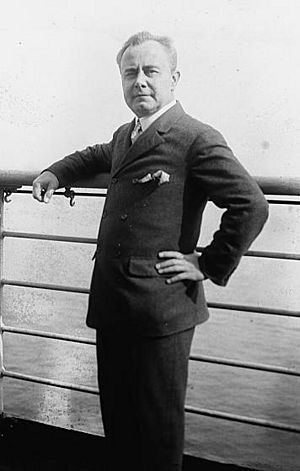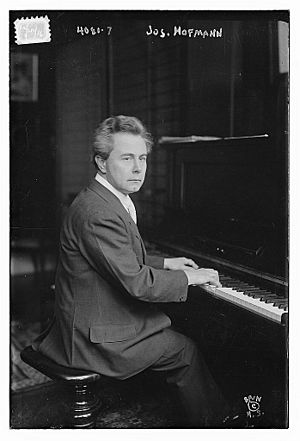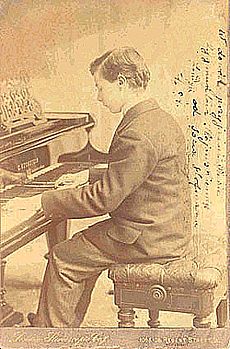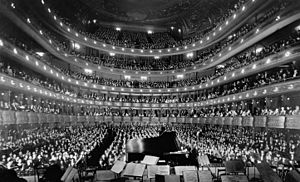Josef Hofmann facts for kids
Quick facts for kids
Josef Hofmann
|
|
|---|---|
 |
|
| Born | January 20, 1876 |
| Died | February 16, 1957 (aged 81) |
| Resting place | Forest Lawn Memorial Park, Glendale |
| Spouse(s) |
Marie Eustis
(m. 1905–1924)Betty Short
(m. 1928–1957) |
Josef Casimir Hofmann (born Józef Kazimierz Hofmann; January 20, 1876 – February 16, 1957) was a famous Polish American pianist, composer, music teacher, and inventor. He was known as one of the greatest pianists of his time.
Contents
Biography
Josef Hofmann was born in 1876 in Podgórze, a part of Kraków, which is now in Poland. His father, Kazimierz Hofmann, was a composer, conductor, and pianist. His mother, Matylda Pindelska, was a singer.
Josef was a child prodigy, meaning he was incredibly talented from a very young age. He gave his first concert in Warsaw when he was just 5 years old. He then performed many concerts across Europe. In 1887-88, he performed in America. People compared him to young musical geniuses like Mozart and Mendelssohn.
In 1892, the famous pianist Anton Rubinstein took Hofmann as his only private student. Hofmann made his official adult debut in Hamburg, Germany, in 1894. For the next 50 years, Hofmann toured and performed a lot, becoming one of the most celebrated pianists of his era. In 1913, he even received the keys to the city of St. Petersburg, Russia.
As a composer, Hofmann wrote over one hundred pieces of music. Many of these were under the pen name Michel Dvorsky. His works included two piano concertos and ballet music. During World War I, he made the United States his home and became a US citizen in 1926.
In 1924, he became the first head of the piano department at the new Curtis Institute of Music in Philadelphia. He later became the Institute's director in 1927 and held that position until 1938. He helped bring many famous musicians to teach at Curtis, such as Efrem Zimbalist and Fritz Reiner. Some of his students became well-known pianists themselves, including Abram Chasins and Shura Cherkassky.
In 1937, people celebrated the 50th anniversary of his first performance in New York. This included a special concert at the Metropolitan Opera in New York City. He retired from public performances in 1948. He spent his last years in Los Angeles, working on his inventions.
Hofmann the Inventor
Josef Hofmann was also a talented inventor. He held over 70 patents! One of his most successful inventions was pneumatic shock absorbers for cars and airplanes. These were used commercially from 1905 to 1928.
Other things he invented included a windscreen wiper and a special furnace that burned crude oil. He even designed a house that could revolve with the sun! He also worked on improving piano rolls and made changes to piano actions that were adopted by the Steinway Company.
Hofmann died in Los Angeles, California, on February 16, 1957. He had four children.
Legacy
To honor Josef Hofmann, the Josef Hofmann Piano Competition was started in 1994. It is co-sponsored by the American Council for Polish Culture and the University of South Carolina Aiken.
Career as a Child Prodigy
When Josef Hofmann was seven years old, Anton Rubinstein heard him play a Beethoven piano concerto in Warsaw. Rubinstein immediately recognized Hofmann's amazing talent. Rubinstein suggested that Hofmann go on a European tour. However, Hofmann's father wanted him to wait until he was nine.
At age nine, Hofmann gave concerts in many countries, including Germany, France, and Great Britain. When he was 12, he was likely the first pianist to record on Thomas Edison's phonograph.
In 1887, an American tour was planned with many performances. However, the Society for the Prevention of Cruelty to Children stepped in. They were worried about the young boy's health because of the demanding schedule. A kind person named Alfred Corning Clark donated money to cancel the rest of the tour. This legally stopped Hofmann from performing in public until he was 18 years old. This marked the end of his incredible child prodigy years.
Musical Education
Thanks to Clark's donation, Hofmann could continue his studies in science and math. He also kept taking music lessons from Heinrich Urban (for composing) and Moritz Moszkowski (for piano).
In 1892, Rubinstein accepted Hofmann as his only private student. They had 42 lessons together. Hofmann was never allowed to bring the same music twice, as Rubinstein wanted him to learn new things constantly. Rubinstein also played many concerts that Hofmann attended, which helped him learn different playing styles.
Rubinstein arranged Hofmann's first adult concert on March 14, 1894, in Hamburg, Germany. Hofmann played Rubinstein's Piano Concerto No. 4, with Rubinstein himself conducting. After the concert, Rubinstein told Hofmann that he had learned all he could teach him. They never saw each other again, as Rubinstein died later that year. Hofmann later said that his time with Rubinstein was the "most important event in my life."
Hofmann's Playing Style
Hofmann wrote a book called Piano Playing with Questions Answered, where he shared his ideas on piano technique. He had small but very strong hands. The piano company Steinway even made him special keyboards with slightly narrower keys.
Unlike his teacher Rubinstein, Hofmann sat very still at the piano. He had an amazing ability to play notes quickly and clearly (called "finger staccato"). He could also create a very rich, full sound, like an orchestra. His student Nadia Reisenberg said he used both finger and foot pedaling together.
Music critic Harold C. Schonberg said Hofmann had all the technique of Leopold Godowsky, another great pianist. Sergei Rachmaninoff, another famous composer and pianist, practiced many hours a day to try and reach Hofmann's level of technique.
Hofmann's playing style can be summed up by his motto: "an aristocrat never hurries." He said that only Rubinstein and Moriz Rosenthal influenced his playing. He also admired singers like Mattia Battistini and Marcella Sembrich. Hofmann usually stuck to the written music, but he played with great spontaneity. Schonberg wrote that only Ferruccio Busoni and Rachmaninoff were considered Hofmann's equals by other musicians of his time. After hearing Hofmann play Chopin's B minor Sonata, Rachmaninoff stopped playing that piece himself, saying he had not heard such powerful playing since Anton Rubinstein.
Repertoire and Memory
Hofmann mostly played music written before the 20th century. He once gave 21 concerts in St. Petersburg without repeating a single piece. He played 255 different works from memory during this series in 1912–1913.
His wife once noted in her diary that he played Brahms' Handel Variations perfectly, even though he hadn't played or looked at the music for two and a half years!
Even though he wasn't great at reading music on the spot, he had an incredible musical memory. People said he could hear a song once and then play it back perfectly without seeing the notes. For example, Rosina Lhévinne remembered that Hofmann heard her husband, Josef Lhévinne, play Liszt's Lorelei. Hofmann had never heard it before, but he played it as an encore at his own concert later that day, just like Josef Lhévinne.
Recordings
Hofmann started making recordings in the 1880s. However, he was never happy with the recording technology of the time. He only made test recordings after 1923, feeling they were a better representation of his playing.
In the 1940s, he recorded for the Bell Telephone Hour radio programs. Some rare videos of these performances still exist.
Some of his earliest recordings were made around 1890 for Thomas Edison on cylinders. These were some of the first recordings of classical music ever made. Four cylinders from Russia (1895–1896) were recently found and released on CD.
Hofmann also made recordings for Columbia and Brunswick from 1912 to 1923. However, he felt these recordings didn't truly capture his unique sound. In 1937, a special concert celebrating his 50th anniversary in New York was recorded live. These concert recordings show Hofmann when he was around 60 years old. They include amazing performances of Chopin's G minor Ballade and F minor Ballade. These recordings have been released on CDs.
His Importance in Music
Many people consider Josef Hofmann to be one of the greatest pianists of the 20th century. Harold C. Schonberg, a music critic, called him the most flawless pianist.
Sergei Rachmaninoff dedicated his Piano Concerto No. 3 in D minor (1909) to Hofmann. However, Hofmann didn't like the piece and never played it. Older critics called Hofmann the "king of pianists." Other famous pianists like Rachmaninoff, Ignaz Friedman, and Josef Lhévinne thought Hofmann was the best pianist of their generation.
However, not everyone agreed. Arthur Rubinstein felt that Hofmann focused too much on the technical side of music and not enough on its emotion. Claudio Arrau also didn't think much of Hofmann's playing. But others, like György Sándor, called him the greatest pianist of the 20th century in terms of music, interpretation, and technique.
Hofmann's student Shura Cherkassky compared him to Vladimir Horowitz, saying Hofmann had a greater musical mind, but Horowitz was the greater virtuoso who appealed to more people. However, pianists like Earl Wild and Jorge Bolet said Hofmann's style greatly influenced them.
See also
 In Spanish: Józef Hofmann para niños
In Spanish: Józef Hofmann para niños
 | William Lucy |
 | Charles Hayes |
 | Cleveland Robinson |




